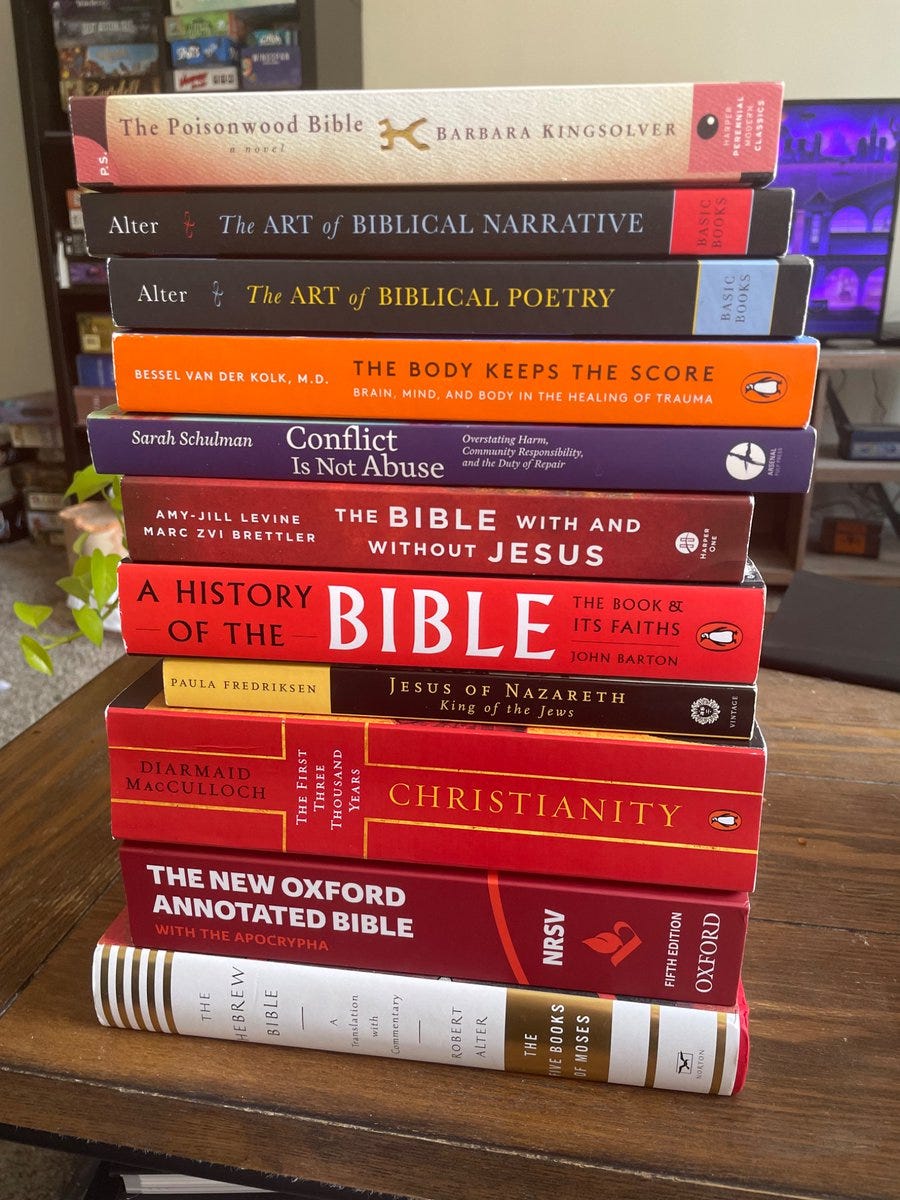Professional Chaos Theory
My winding path through liberal arts, layoffs, and learning to love AI
Editor's Note: I've been trying to write this essay in some fashion or other since 2014, when I finally landed my first full-time job after months of post-grad flailing. I kept starting drafts, wanting to reach back through time and tell the 23-year-old version of myself that everything would work out. The problem was, I never knew what I wanted to say.
Now, a decade later, as I make the (from the outside) rather baffling career leap into running AI operations at Every, I finally know what I want to tell her.
Professional Chaos Theory
I was sitting on a couch in my parents’ basement, wrapped in an ancient afghan to ward off the air conditioning that was always a bit too cold. On one screen was HBO’s Girls, which I was binge-watching aggressively; on the other, a blank Word document where a resume was supposed to be.
It was 2013 and I was 23, armed with an English-German Literature degree and fresh off the plane from a year abroad in Germany. I could tell you about themes of purity and violence in Wuthering Heights, or lecture you on the moral complexities of Väterliteratur. But confronted with a blank page labeled "My Future,” I was hopelessly at sea.
This isn’t a story about despair, although there’s been my share of that along the way; nor is it a story with a happy ending, because this is not a marriage plot. This is a story about convergence, and how the universe conspires both with and against us. It’s about the choices we make and how, somehow, they add up to form a life.
What I’d like to propose is that a career isn’t the ladder or even the jungle gym we’ve been promised—especially now, given [gestures broadly]. A career is like a prism: tilt it slightly and the same experiences throw off entirely different colors. Rejection becomes redirection, randomness becomes revelation. At least, that’s how it’s been for me.
So here it is: my thoughts on navigating the career prism, and what happens when all of the points of light converge.
The Seemingly Useless Becomes Essential
I’ve mentioned my degree, so I’ll say up front: my relationship with that piece of paper has been fraught. I spent my first post-grad years resenting it, convinced I should have majored in something with a direct pipeline to employment. I stalked the Facebook profiles of friends who had chosen more “sensible” paths and felt like I had trapped myself in a cul-de-sac of my own making.
It’s beyond liberal arts school cliche at this point to say that the value of an education is in teaching you “how to think,” but it took about a decade for it to really sink in for me what, exactly, my liberal arts education had trained me to do: hold contradictory ideas simultaneously, extract meaning from chaos, and navigate intellectual terrain without clear signposts. Flash forward to today, as I decode error messages in Lovable or fixate on the wording of a prompt, and I’m drawing on the same mental muscles I'd built wrestling with Der Prozess.
The point isn't that liberal arts degrees are the secret keys to the career kingdom (JK unless?) What I’m saying is that in the career prism, everything you learn becomes part of the spectrum of light you uniquely refract. The things that seem most disconnected from "real world value" often become the unexpected differentiators that set you apart.
The Universe Will Force Your Hand
As a kid, I was not used to failing. I basically collapsed the first time I got a B+. I excelled in academic environments, followed instructions well, did the readings and the optional readings and wrote my essays two weeks in advance. But the working world doesn’t have a syllabus, and it doesn’t give points for showing your work.
At first, setbacks felt like personal failings, proof that I was fundamentally unsuited for the world of work. I took jobs in pharmaceutical advertising and crypto, convinced I could mold myself into someone who belonged there. I was a “high achiever,” after all; I didn’t have to care about the subject—wanting the A was enough. But the universe has a funny way of rejecting our attempts to force ourselves into spaces where we don't belong. When we try to choose paths based on what we think we should want rather than what actually resonates, the cosmos tends to intervene.
This has led to some small catastrophes: a PIP here, a letting go there. When I was let go from the crypto job, I felt like a failure. But that setback pushed me to reassess what I actually wanted—to stop trying to fit myself into a version of success that someone else had defined. If I hadn’t faced those forced pivots, I might have stayed on a path that was misaligned for years longer. I might have never realized I was capable of building something for myself.
The most significant redirections in my career have come through failure. Each spectacular flameout forced me to reconsider my assumptions about what I was "supposed to" be doing. These breaking points weren't evidence that I wasn't good enough, despite what the black-and-white voice in my head tried to tell me; they were evidence that I was trying to refract light in directions that weren't natural to my particular prism. Each failure narrowed the field of possibilities, pushing me closer to the convergence point where my actual abilities, interests, and opportunities would eventually meet.
Leap Before the Path is Clear
On a session a while back, my therapist called me a “risk-taker” and in the tiny window at the corner of my computer screen, I saw myself flinch. That wasn’t really a trait that I saw in myself—but then again sometimes we’re too close to our own experiences to see how they fit together.
It’s true that I've taken some dramatic leaps—some terrifying if I let myself think about it, which I have generally done only in hindsight. Some have worked out spectacularly; others have not. But at the end of every leap, I’ve found a stepping stone. This is the paradox of the career prism: you have to commit to refraction before you understand where the light will lead.
My first foray into freelancing was perhaps my most reckless. I had no clients, no references, no real skills to speak of beyond "doing words good." I wasn't so much launching a career as diving headfirst into the abyss. But if I hadn't made that leap, I wouldn't have connected with the only real freelancer I knew in that world. If I hadn't connected with her, I wouldn't have been invited into The Binders. If I hadn't joined Binders, I wouldn't have found GrowthLab, then Animalz, then Every.
None of these stepping stones were visible from where I stood before jumping. I couldn't have strategized my way to them. The only way to discover them was to leap and trust that something would emerge to catch me, and that movement itself will lead to possibilities that stillness never will.
Be Ready for the Remix
The final facet of the career prism—perhaps its most magical property—is its ability to create something entirely new when disparate elements coalesce into new combinations. For me, these forces have acted like cosmic DJs, sampling bits of my experience and remixing them into something I could never have imagined on my own.
When AI entered my world, it created a collision point where everything I'd learned suddenly found new expression. The storytelling from my literature background, the analytical skills from content marketing, the client management from consulting—AI has become the mixing board where all these tracks come together.
I couldn’t have planned or predicted this collision. It emerged organically from the particular constellation of experiences that made up my career prism. Someone with the same access to AI but a different background would create something entirely different.
Most career advice has focused on specialization—becoming the best at one narrow thing. But the career prism works differently. It draws power from breadth, from the unique combinations that only you can create, from the intersections between seemingly unrelated domains. Your most distinctive professional contribution will likely come not from mastery of a single sphere, but from the unique alchemy that happens when your varied experiences collide.
From Chaos to Coherence
When I look back at that 23-year-old in the basement, paralyzed by the emptiness of a blank resume, I wish I could tell her: don't worry about fitting yourself into existing boxes. Collect experiences like a magpie collects shiny objects. Trust that the remix will come, and when it does, it will transform everything you thought was disconnected into something surprisingly cohesive.
That's the beauty of the career prism: it bends chaos into coherence. Each moment—each job, setback, leap of faith, and unlikely relationship—is another angle on the glass, refracting your experience into new spectrums. The very moments that seemed random or even misguided at the time become essential facets, catching and reflecting light you never even realized was there.
Notes and Errata
Where to find what: I'll be writing a ton about what I learn from AI ops, but that will live on Every, so keep an eye out there. The Curiosity Gap will be for weirder stuff, so I hope you're excited about that.
Speaking of weird, I've been having lengthy conversations with my bookshelf (aka a Google Sheet of books I've kept going back to 2007 that I plugged into ChatGPT) and it explained something that has been a mystery even to me: why I give books the ratings I do.
Here's a list of moves ChatGPT says are not my favorite (accurate):
Also, I'm embarking on a bit of an intellectual side hustle reading up on biblical history and interpretation, so if that shows up here and it's not your bag, I can only apologize. (For a fun exercise, give this picture to o3 and have it guess what I’m studying up on.)
Stay curious,
Katie P.







Fantastic story! I am so glad you found your way off the ladder and Excel sheet (jungle gym choices) into prisms, light, and the reality of time, aging, learning, experimenting, and exploring. The best news is you may be less than halfway done with your life. You'll be glad you figured this out sooner than 45.
Beautiful and engaging writing, Katie.
I can hear echoes of Job's Commencement Speech in here, the more things change, the more they stay the same.